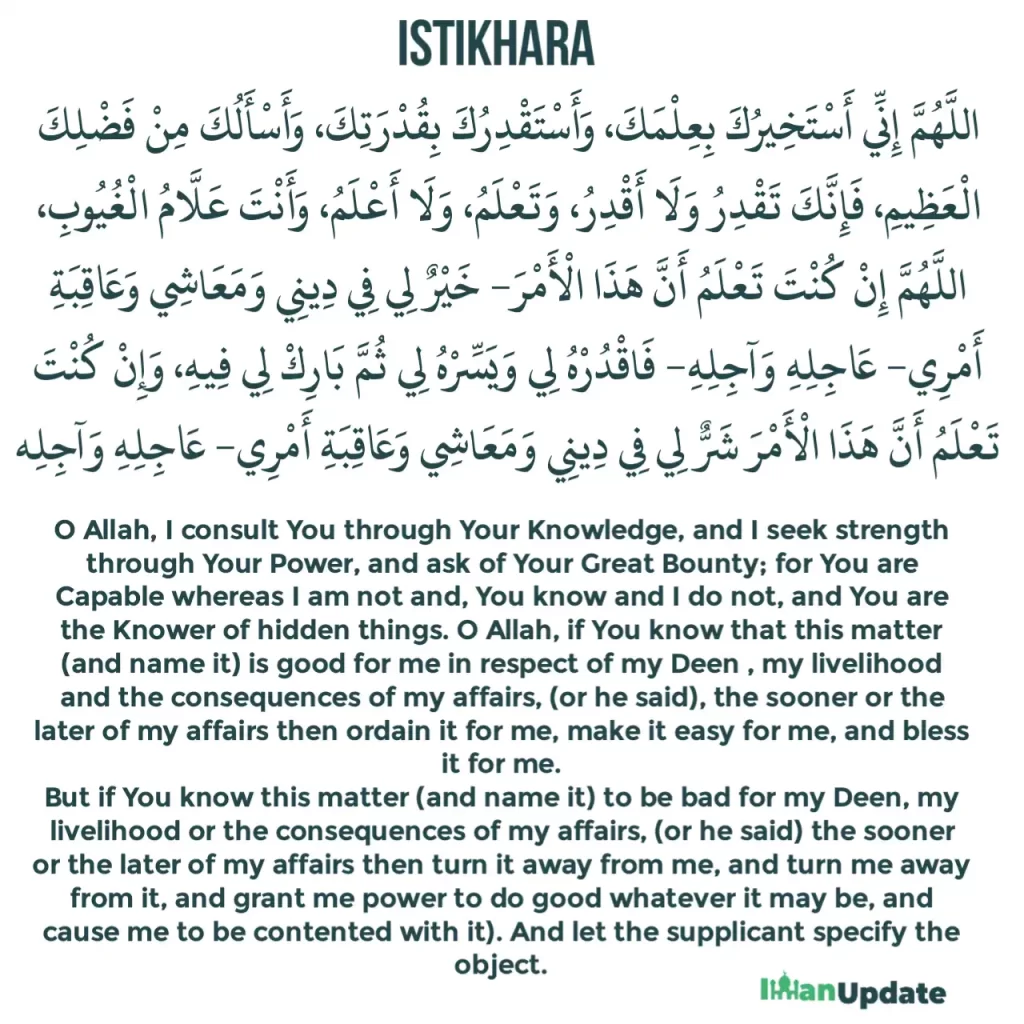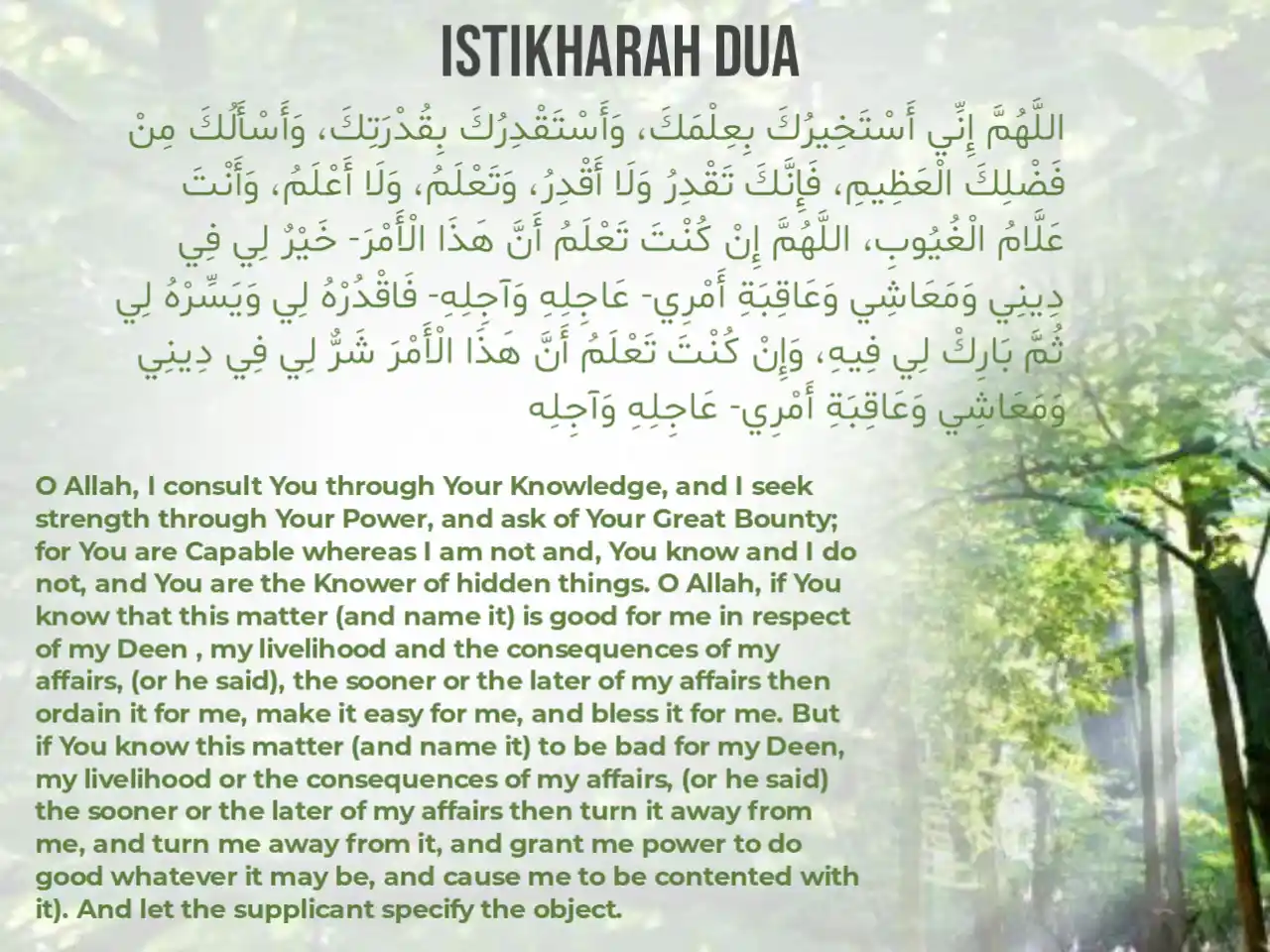Istikhara Dua in Arabic Text, Transliteration And Meaning
Istikhara dua is a Sunnah which the Prophet SAW prescribed for anyone who wants to do an action but is hesitant about it.
Advertisements
Here is the Dua in Arabic text, transliteration, translation, meaning and how to make it.
Istikhara Dua in Arabic
Here is the dua Istikhara written in Arabic Text
اللَّهُمَّ إِنِّي أَسْتَخِيرُكَ بِعِلْمَكَ، وَأَسْتَقْدِرُكَ بِقُدْرَتِكَ، وَأَسْأَلُكَ مِنْ فَضْلِكَ الْعَظِيمِ، فَإِنَّكَ تَقْدِرُ وَلَا أَقْدِرُ، وَتَعْلَمُ، وَلَا أَعْلَمُ، وَأَنْتَ عَلَّامُ الْغُيُوبِ، اللَّهُمَّ إِنْ كُنْتَ تَعْلَمُ أَنَّ هَذَا الْأَمْرَ- خَيْرٌ لِي فِي دِينِي وَمَعَاشِي وَعَاقِبَةِ أَمْرِي- عَاجِلِهِ وَآجِلِهِ- فَاقْدُرْهُ لِي وَيَسِّرْهُ لِي ثُمَّ بَارِكْ لِي فِيهِ، وَإِنْ كُنْتَ تَعْلَمُ أَنَّ هَذَا الْأَمْرَ شَرٌّ لِي فِي دِينِي وَمَعَاشِي وَعَاقِبَةِ أَمْرِي- عَاجِلِهِ وَآجِلِه
Dua For Istikhara Transliteration
Allahumma inni astakhiruka bi ‘ilmika, wa astaqdiruka bi qudratika, wa as-’aluka min fadlikal-‘azim. Fainnaka taqdiru wa la aqdiru, wa ta‘lamu wa la alamu, wa Anta ‘allamul-ghuyub. Allahumma in kunta ta’lamu anna hadhal-‘amra (and name what you want to do) khairun li fi dini wa ma’ashi wa ‘aqibati amri, (or he said) ‘ajili amri ajilihi, faqdurhu li wa yassirhu li, thumma barik li fihi.
Advertisements
Wa in kunta ta’lamu anna hadhal ‘amra (and name what you want to do) sharrun li fi dini wa ma’ashi wa ‘aqibati amri, (or he said) wa ‘ajili amri wa ajilihi, fasrifhu ‘anni, wasrifni ‘anhu, waqdur liyal- khaira haithu kana, thumma ardini bihi .
Dua Istikhara in Meaning English
This is the Dua for Istikhara or what to say during Istikhara in English:
O Allah, I consult You through Your Knowledge, and I seek strength through Your Power, and ask of Your Great Bounty; for You are Capable whereas I am not and, You know and I do not, and You are the Knower of hidden things. O Allah, if You know that this matter (and name it) is good for me in respect of my Deen , my livelihood and the consequences of my affairs, (or he said), the sooner or the later of my affairs then ordain it for me, make it easy for me, and bless it for me.
But if You know this matter (and name it) to be bad for my Deen, my livelihood or the consequences of my affairs, (or he said) the sooner or the later of my affairs then turn it away from me, and turn me away from it, and grant me power to do good whatever it may be, and cause me to be contented with it). And let the supplicant specify the object.
[Al-Bukhari 1166 and Muslim]
Advertisements
What is Istikhara?
Istikhara in Arabic means seeking guidance to make a decision concerning something. In Shari’a terminology, Istikharah means seeking guidance (to the right decision), that is seeking guidance as to what Allah knows is the best and most appropriate choice, by means of prayer or the dua narrated concerning Istikhara.

How Many Times To Pray Istikhara?
You can pray Istikhara three times. Ibn Uthaiymeen said that: He should give the Prayer for guidance thrice, because from the general practice of the Prophet SAW, was that when he supplicated, he did so three time, and Istikhaarah is a kind of supplication as well.
Istikhara signs
Allah may not make his heart lean towards a particular option till he consults the peoples and afterwards Allah makes his mind firm upon a decision.
Advertisements
The best of the two options may not be clear to the individual from the onset, and it may from the very beginning, or the second time or still, only at the third time. And if it still does not become clear, then you should consult.
Thereafter, if his heart tends to one of the two options, that is, to continue or to desist, this is what is excepted; he should choose what his heart tends to.
But if his heart does not lean to any of the two, then he should repeat the Istikharah a second and third time.
Hadith About Dua Istikhara
Jabir reported: Messenger of Allah SAW used to teach us the Istikharah (seeking guidance from Allah) in all matters as he would teach us a Surah of the Qur’an. He used to say: “When one of you contemplates entering upon an enterprise, let him perform two Rakah of optional prayer other than Fard prayers and then supplicate the above Dua for Istikhaara.

Why Should You Pray Dua E Istikhara?
Because man necessarily has defects or deficiencies, and he is created weak; he may be confused regarding a matter and hesitant about it; what does he do?
The reason why Istikharah is prescribed is that it is submission to the command of Allah and a practical demonstration that one has no power and no strength of one’s own.
It means turning to Allah and seeking to combine the goodness of this world and of the Hereafter. In order to achieve that, one has to knock at the door of the King, Allah, may He be glorified, and there is nothing more beneficial in this regard than salaah (prayer) and du’aa’ (supplication), because they involve venerating Allaah, praising Him and expressing one’s need for Him.
Then after praying istikhaarah one should do that which one feels is best.
Let’s assume he wants to travel but he doubts whether it is good or bad (for him); or that he intends to buy a car or house or seeks to propose to a man to marry his daughter or similar other things, but he about it.
What then should he do?
According to Ibn Uthaiymeen, he has two paths:
- The first path: To ask the Lord of all that exists – the Mighty and Sublime Who knows the past and the future and how they will happen.
- The second path: After that, he should consult the people of reason, piety and trust.
The Prophet SAW who was the best person in his thoughts and most correct of them would also seek the advice of his companions in some matters that prove difficult.
Likewise the caliphs after him, they would consult the upright and reasonable persons.
These two conditions are unavoidable regarding the person you wish to consult: that he is learned and experienced regarding the matter, critical and not hasty, and that he is upright upon his religion.
Because the person who is not upright in his religion cannot be trusted even if he were intelligent and experienced in the matters, there is no gain consulting him.
He does not deserve to be among those who are consulted because being not upright in his religion, he could be treacherous, and the refuge is with Allah, and direct you that which is harmful or something which is not beneficial and then cause evil and destruction to an extent Allah alone knows.
Let us suppose he of the people of sin, shamelessness and evil, it is not permissible to seek his advice because that will put you in to a pit of destruction!
Similarly, if he were upright in his religion, intelligent and trustworthy but indifferent and inexperienced or hasty and not insightful, do not be eager to consult such a person because if he is negligent and inexperienced, he might approach them superficially, not paying attention to their antecedents.
If he is hasty as well, his impatience could make him direct you to something lacking in any benefit.
So, the individual must necessarilybe a person of insight, reason and uprightness in his religion.
When Should He Start Praying Istikharah?
The Prophet SAW had pointed to that; that the individual should observed two units of non-obligatory Prayer at other than the times in which observing the Prayers are prohibited except if the matter involves urgency before the end of prohibited time; then, the Prayer could be observed even during mentioned the prohibited times.
However, if the matter is not pressing, then it is not allowed to observe the Prayer for Asking Allah for guidance within the prohibited period:
After the ‘Asr Prayer, do not give the Istikharah, likewise after the Fajr Prayer till the sun rises the height of a spear.
Similarly, the supplication should not be made while the sun descends its horizon till it fully leaves except when the matter compels immediate action.
In What Circumstances Should One Pray istikharah?
The four madhhabs are agreed that istikharah is prescribed in cases where a person does not know the right decision to make.
In matters where it is known whether a thing is good or bad, such as acts of worship, doing good deeds, sins or evil actions, there is no need to pray istikhaaah in these cases.
But if a person wants to find out the right time to do something, such as whether to do Hajj this year, because there is the possibility of encountering an enemy or some tribulation, or whether to go with a certain person or not, then he may pray istikhaarah with regard to such decisions.
But there is no room for Istikharah when it comes to things that are obligatory, haraam or makrooh.
Rather Istikarah has to do with things that are recommended or permissible.
Istikharah is not ordinarily required with regard to things that are recommended, rather it should be done in cases where there is a conflict, that is, when a person has a choice of two things and must decide which one to start with or which one not to do.
With regard to permissible things, he may pray Istikhaarah as a regular matter.
What Is To Be Recited In Istikhara Prayer?
There are three opinions as to what should be recited in Istikhara prayer:
- The Hanafis, Maalikis and Shaafa’is said that it is mustahabb, after reciting al-Faatihah, to recite Qul ya ayyuhal kaafiroon in the first rak’ah and Qul huwa Allaahu ahad in the second.
Al-Nawawi said, explaining the reason for that: It is appropriate to recite these in prayer, to show sincerity and expressing your leaving your affairs to Allaah.
They said that it is also permissible to add other verses from Qur’aan where the context refers to the idea of making a choice or decision.
- Some of the Salaf said that in praying istikharah it is good to add, after reciting al-Faatihah, the following verses in the first rak’ah:
And the following verse in the second rak’ah:
Surah al-Ahzaab 36
- The Hanbalis and some of the fuqaha’ did not say that any particular verses are to be recited when praying Istikhaarah.
When Should You Pray Istikhaarah?
The Hanafis, Maalikis, Shaafa’is and Hanbalis stated that the du’aa’ should be recited immediately after the prayer.
This is in accordance with what was stated in the hadeeth narrated from the Messenger of Allaah (peace and blessings of Allaah be upon him).
According to Ibn Taymiyya, it is permissible to recite istikhara prayer before or after the salaam, whether you are praying salaat al-istikhaarah or another prayer.
Reciting dua before the salaam is preferable, as the Prophet (peace and blessings of Allaah be upon him) used to recite a lot of du’aa’ before the salaam, and the worshipper before saying the salaam still in a state of prayer, so it is better to recite the dua then.
How to pray Istikhara?
The description of Salat al-Istikharah (istikharah prayer) was reported by Jabir ibn ‘Abd-Allah al-Salami (may Allah be pleased with him) who said:
The Messenger of Allah (peace and blessings of Allah be upon him) used to teach his Companions to make istikharah in all things, just as he used to teach them surahs from the Quran.
He said: If any one of you is concerned about a decision he has to make, then let him pray two rak’ahs of non-obligatory prayer.
How To Pray Istikhara Step By Step
Here is the step by step guide on how to pray Istikhara
- Perform Ablution or Wudu
- Prepare your space for prayer
- Open your prayers
- Recite the Surah Fatiha
- Recite the Surah al-Kafirun or any surah of the Quran
- Continue your two rak’ah of sunnah prayer
- Make the dua mentioned in the detailed above.

Meaning Of Istikhara Dua
The phrase O Allah, I seek Your guidance by virtue of Your knowledge is explaining because You know best.
Similarly, by virtue of Your power most likely means seeking Your help.
I seek ability (astaqdiruka) means I ask You to give me the power or ability (qudrah) to do whatever is being asked for, or it probably means I ask You to decree (tuqaddir) this for me. So it may mean making it easy.
I ask You of Your great bounty refers to the fact that Allah gives out of His great generosity, but no one has the right to His blessings. This is the opinion of Ahl al-Sunnah.
You have power, I have none. And You know, I know not refers to the fact that power and knowledge belong to Allah alone, and the slave has no share of them except what Allah decrees for him.
O Allah, if in Your knowledge this matter, according to one report, he should mention it by name.
It is apparent from the context that he should state it, but it is probably sufficient to be thinking of the matter whilst making this du’a.
Then ordain it for me means make it happen for me or it may mean make it easy for me.
Then turn it away from me, and turn me away from it means so that my heart will no longer feel attached to it after it has been turned away.
Make me pleased with it means make me content with it, so that I will never regret asking for it or be sorry that it happened, because I do not know how it will turn out, even if at the time of asking I am pleased with it.
The secret is that one’s heart should not be attached to the matter in question, because that will result in a person becoming restless.
Being pleased with something means that one’s heart is content with the decree of Allah.
And Allah knows best.
Advertisements








One Comment